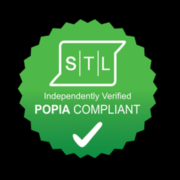Most people recognise the terms divorce attorney, conveyancer and criminal attorney, but only a few are aware of the growing need for a technology attorney. Worldwide, the evolution of technology has brought about a multitude of legal problems and South Africans are not immune to these, yet not a lot of people have ever heard of a technology attorney.
Business continues to move online and in any conversation you’ll come across the words “data privacy”, “cyber-crime”, “online retailer”, “App development” and many more.
So what exactly does a technology attorney do?
Basically – anything to do with the law and technology. Here at SwiftTechLaw we specialise in the following areas:
GRC (GOVERNANCE, RISK AND COMPLIANCE) – which includes PRIVACY LAW COMPLIANCE (POPIA & GDPR). Information privacy is a hot topic at the moment as the Information Regulator creeps closer to being established. Once this happens South African organisations will need to comply or face hefty penalties. We assist our clients with their compliance, which includes providing them with all required documentation, training and website updates.
DOMAIN NAME RIGHTS AND DISPUTES – Having a company website / online store in this day and age is becoming vital to the success of any organisation and securing your domain name is the first step. We assist with any matters relating to domain name registrations and disputes.
APP DEVELOPMENT – Have an idea for a new app? SwiftTechLaw can assist.
CRYPTOCURRENCY TRANSACTIONS – Crypto-currency investment remains the wild west of South Africa’s financial landscape. There is no cohesive regulation which restricts transactions or facilitates trade and this exposes investors to many risks. Organisations providing platforms for cryptocurrency transactions should also keep up to date with the latest regulations in order to minimise the risk for themselves and their investors. We assist by providing legal opinions and advise on how to minimise the risk of cryptocurrency transactions while the regulation thereof remains mostly unclear.
SOCIAL MEDIA RIGHTS PROTECTION / SEXTORTION / CYBERBULLYING / REVENGE PORN
START-UP / INCUBATOR ASSISTANCE – We assist start-ups with Non-disclosure Agreements, Non-compete Agreements, Registering different types of intellectual property (I.P), Contractual Terms of Business for each specific start-up, Website Privacy Policies and T&C’s, POPIA and GDPR Training.
TRADEMARK REGISTRATION – Trademark registration is a crucial first step for your start-up in order to ensure that you are able to continuously build your brand. If you decide that you don’t want to register your trademark, or that will get around to it once your company has become more established, it’s important that you understand the possible implications of not investing in the protecting of your intellectual property. Let us assist you in building your brand by with our trademark registration services.
COMMERCIAL TECHNOLOGY LAW – need to register a new company? Need assistance in the drafting of End User Licence Agreements? Software Agreements? Or Tech Deal Structuring? SwiftTechLaw provides a wide variety of legal services relating to commercial technology law.
TECHNOLOGY AND CIVIL LITIGATION – need to send a letter of demand? Don’t know what your options are in terms of legal recourse? We assist clients in settling or proceeding further with their legal disputes.
We also specialise in ARTIFICIAL INTELLIGENCE, CYBER CRIMES AND HACKING, ELECTRONIC SIGNATURES, GAMBLING AND GAMING TRANSACTIONS, CONSUMER RIGHTS AND DISPUTES.
Contact SwiftTechLaw here to assist you with your legal needs.



